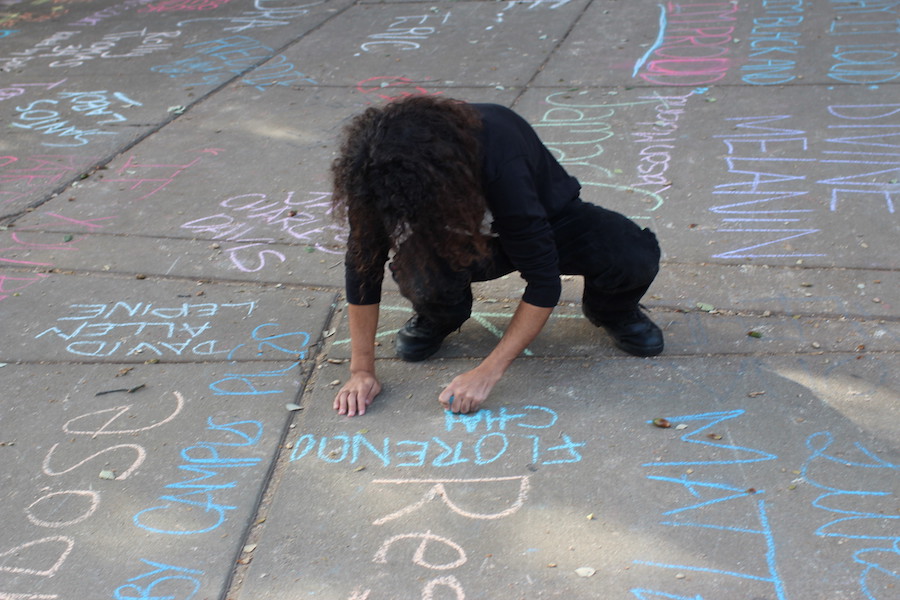
Protesters write names of police brutality victims on UC Davis Quad as part of ‘Disarm the Pepper Spray University’ protest.
On Nov. 18, UC Davis students against police brutality took their frustrations to the Quad in an effort to increase visibility of the issue as part of the “Disarm the Pepper Spray University” protest.
The protest was held on the same day as UC Davis’ 2011 pepper spray incident, when former UC Davis Police Lieutenant John Pike pepper-sprayed a line of nonviolent protesters.
At noon, the protesters gathered on the Quad, where demonstrators handed out pieces of paper that displayed six names of police brutality-related deaths that occurred earlier this year. Additionally, the demonstrators also handed out chalk for protesters to write other names of police brutality victims from 2015. In a matter of minutes, the Quad was filled with hundreds of names.
Additionally, the protesters displayed a board with names of students who were victims of police brutality within the UC system to add increased significance to the movement.
“This is non-stop; we are going to keep coming out here to protest, to bring light to what has been happening on campus and around the nation,” said Pablo Silva, a history graduate student.
He continued to stress the importance of the movement against police brutality and put emphasis on the impact that writing these names on the campus can have.
“We can never gauge what the real impact can be, but I think it is important for us to be out here,” Silva said. “The names have a deep impact. For sure it brings awareness and it starts a dialogue.”
Brandon Buchanan, a sociology graduate student and a protest organizer, expressed how this movement can affect those who see the display.
“This action is about physically taking up space with the names of people who have been killed by police just this year,” Buchanan said. “Part of what we’re trying to do is express awareness amongst the student body that these people are being killed.”
According to Buchanan, the decision to hold the protest on the anniversary of the 2011 pepper spray incident at UC Davis was chosen by the protesters to further emphasize the dire need to stop police brutality.
“We chose this space for a number of reasons and we chose this day for a number of reasons,” Buchanan said. “We chose this space because the front of the Memorial Union has a lot of traffic. We hope to disrupt the everyday operation of the university.”
With regard to the protest, Andy Fell, associate director of news and media relations at UC Davis, referenced a website the university created after the 2011 pepper spray incident in order to increase transparency for police-related issues at the university.
“We were aware of the protest, of course,” Fell said. “I don’t think I have a specific comment to make on this protest, but I want to note that since November 2011, UC Davis conducted and has implemented recommendations from several reports.”
The day after the protest, the university washed away a majority of the names written on the Quad. Dave Lawlor, vice chancellor and chief financial officer at UC Davis, released a statement the following day via email to the entire student body with an apology for the action and a reason behind the decision to erase the names.
“I am deeply sorry that university employees erased the names of more than 1,000 people who were killed by police,” Lawlor said in the email. “Please know that erasing the names was a mistake, and it was fundamentally wrong. As the lead for the university’s finances, operations, and administration, I take full responsibility for these actions.”
Following his apology, Lawlor touched briefly on the statistics of police brutality in the United States and finished his statement with a list of names of individuals who have died due to police.
“The number of people killed by police stands at 1,053 since Jan. 1,” Lawlor said. “Here are the names of 1,040; names were not available for 13 of them, and ages only were available for four.”
Emily Breuninger, a sociology graduate student, expressed her negative opinion on police brutality, criticizing the issue for now being part of UC Davis’ legacy.
“We are not isolated; we have problems with police brutality and racism on our campus,” Breuninger said. “This is the anniversary of the pepper spray incident. We have become world-renowned for police brutality.”
Written by: Nick Griffen – campus@theaggie.org



